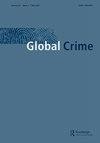政治化犯罪:拉丁美洲有组织犯罪政治化的原因
IF 1.9
Q2 CRIMINOLOGY & PENOLOGY
引用次数: 6
摘要
犯罪集团为何决定采用政治话语?我们认为,当国家宣布该组织是一个存在的威胁,军事化打击它(证券化),以及武装组织的领导人接受过政治训练时,武装组织的话语政治化(公开宣布政治动机)更有可能发生。这种说法旨在减少国家对他们的军事行动,并获得民间的支持。这一论点是通过对六个拉丁美洲案例的定性比较分析来证明的:哥伦比亚和拉斯特罗霍斯autodefenas Gaitanistas和Los Rastrojos(哥伦比亚)、Perú共产党军国主义党(秘鲁)、Primeiro Comando da Capital(巴西)、特伦·德·阿拉瓜(委内瑞拉)和锡那罗亚卡特尔(墨西哥)。其中三个采用了政治话语,其他的没有。我们为不一定符合叛乱,准军事或简单犯罪集团类型的犯罪行为者提供了一个分析框架。本文章由计算机程序翻译,如有差异,请以英文原文为准。
Politicised crime: causes for the discursive politicisation of organised crime in Latin America
ABSTRACT Why do criminal groups decide to adopt political discourses? We argue that an armed group’s discursive politicisation (the public declaration of political motivations) is more likely when the state declares the organisation to be an existential threat, militarises the fight against it (securitisation), and when the leaders of the armed group have had political training. This discourse aims to reduce the state’s military actions against them and gain civilian support. This argument is demonstrated through a qualitative comparative analysis of six Latin American cases: Autodefensas Gaitanistas de Colombia and Los Rastrojos (Colombia), Militarizado Partido Comunista del Perú (Peru), Primeiro Comando da Capital (Brazil), Tren de Aragua (Venezuela), and Cartel de Sinaloa (Mexico). Three of them adopted a political discourse, and the others did not. We provide an analytical framework for criminal actors who do not necessarily fit into insurgent, paramilitary or simple criminal group typology.
求助全文
通过发布文献求助,成功后即可免费获取论文全文。
去求助
来源期刊

Global Crime
CRIMINOLOGY & PENOLOGY-
CiteScore
3.90
自引率
4.50%
发文量
22
期刊介绍:
Global Crime is a social science journal devoted to the study of crime broadly conceived. Its focus is deliberately broad and multi-disciplinary and its first aim is to make the best scholarship on crime available to specialists and non-specialists alike. It endorses no particular orthodoxy and draws on authors from a variety of disciplines, including history, sociology, criminology, economics, political science, anthropology and area studies. The editors welcome contributions on any topic relating to crime, including organized criminality, its history, activities, relations with the state, its penetration of the economy and its perception in popular culture.
 求助内容:
求助内容: 应助结果提醒方式:
应助结果提醒方式:


